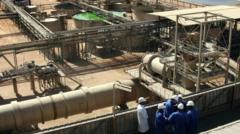In a bold statement reflecting shifting geopolitical allegiances, Niger's military junta has decided to nationalize the majority French-owned uranium firm, Somaïr, operated by Orano. This move emphasizes Niger's intent to secure more local authority over its mineral wealth since the junta seized power in 2023. The decision comes amidst growing frustrations with France, as the junta accuses Orano of “irresponsible acts." Niger, known as the world's seventh-largest uranium producer with the highest-grade ores in Africa, hopes that nationalization will ensure a more sustainable management of its vital resources. The junta believes this step will better serve the interests of Nigeriens and allows the country to distance itself from its colonial past. Orano, holding a 63% stake in Somaïr, has refrained from immediate comment, but it has initiated legal action against the Nigerien government concerning its operational control over the firm. Analysts warn that this new uncertainty in the mining sector could jeopardize hundreds of jobs and threaten significant export earnings for the country.
Niger's Military Junta Moves to Nationalize Uranium Operations

Niger's Military Junta Moves to Nationalize Uranium Operations
Niger's new military leaders escalate tensions with France by announcing plans to nationalize uranium mines, aiming for greater control over the country's mineral resources.
Niger's independence from France in 1960 has not erased historical tensions, and many view this nationalization as a pivotal moment in its assertion of sovereignty. The move reflects the junta's aim to break free from perceived neo-colonial influences and align more closely with alternatives, potentially including Russia. However, experts stress that the future of the mining sector hangs in balance, raising concerns about the implications for both local employment and the economy.
This dynamic situation remains under scrutiny, as Niger navigates its relationship with global powers while aiming for a more equitable distribution of its natural resources.
This dynamic situation remains under scrutiny, as Niger navigates its relationship with global powers while aiming for a more equitable distribution of its natural resources.



















